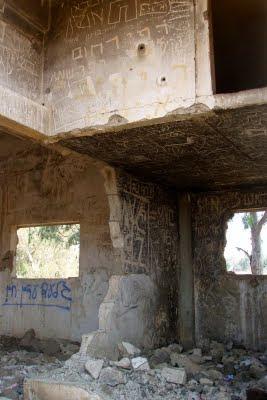The Golan Heights
One of the first places we went to in Israel was up north to the Golan Heights, which was won from Syria in the 1967 war, also known as the Six Day War. During this visit we saw not just the beautiful, lush land, but also one factor that allowed Israel to have won it (and the war) so quickly.
Eli Cohen, a famous, Egyptian born Israeli spy, was chosen by the Israeli government to infiltrate a prominent Syrian community. Helped by his perfect Arabic, Cohen managed to gain acceptance among the Syrians for several years. During this time, one of his most important acts as a spy was to suggest that the Syrian military, in order to provide shade and protection for their men, plant eucalyptus trees around their bunkers in the Golan Heights. Although the men did indeed enjoy extra cover and shade after heeding such advise, they also made their bunkers easy targets in the Six Day War that was soon to come. As the Israeli air force flew over the Golan Heights, they knew to look for the little pockets of eucalyptus trees, and Israel quickly and efficiently took out it's enemy neighbor.

Even as we heard this amazing story of victory and walked through such a beautiful landscape, the question of keeping the Golan Heights could not be muted. At one of the lookout points we saw Syria, seemingly within throwing distance, and discussed whether or not giving back the Golan Heights would bring peace. To give up the beautiful waterfalls, the delicate pink flowers; to forfeit the strategic military advantage; to allow Israel to bow its head in humility while giving up a piece of land that so many people fought and died for would all be worth it if only peace were guaranteed. But would it be? These are the questions that many people are still wondering. And while we were standing on that lookout, we got a taste of the bitterness of these questions in our mouths as well.




Comments
Post a Comment